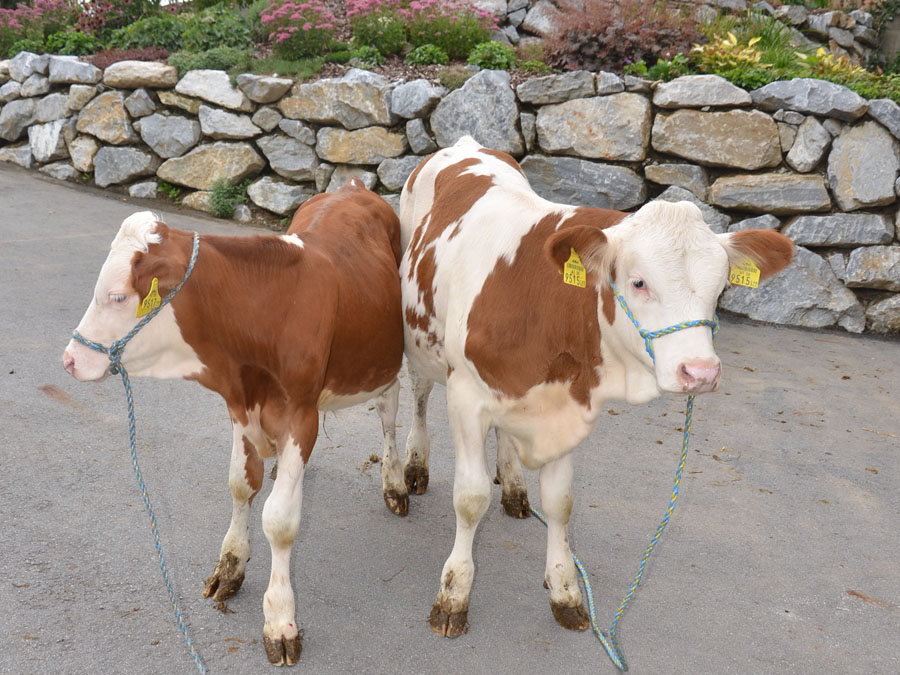DNA analysis for disease prevention in breeding populations
Scientists identify cause of growth disorder in cattle

The brown and white Fleckvieh is one of the four most important cattle breeds rearing, currently accounting for an estimated 40 million animals worldwide. With artificial insemination now being the main mode of cattle breeding, a single breeding bull can generate over a hundred thousand progeny.
The genomes of most of the Fleckvieh cattle can thus be traced back to a small number of ancestors. Individual animals within current populations are closely related, allowing recessive traits and disorders to spread unnoticed. These only become evident when the relevant predisposition is passed on by both parents, making the offspring homozygous for that particular trait.
Genetic mutation stunts growth
A research team drawn from Technische Universität München (TUM), Austrian data processing service ZuchtData and the University of Veterinary Medicine, Vienna, has now identified a recessively inherited disease in the Fleckvieh cattle breed that was previously unknown.
“The affected calves and young animals exhibit significantly stunted development in comparison with their healthy contemporaries despite normal feed intake – growing at roughly half the pace and gaining only half the weight. Apart from that, though, they look completely healthy,” explains Dr. Hubert Pausch from TUM’s Chair of Animal Breeding.
Researchers examined bovine genotypes for specific genetic features that can indicate diseases. They discovered four regions of the genome that have a negative impact on reproductive and rearing success – and animals homozygous for one of them were significantly stunted in growth. With the aid of comprehensive genome sequencing analysis, the researchers were then able to identify the genetic mutation responsible for this growth disorder.
Similar condition in humans
In all the growth-stunted animals examined, the SLC2A2 gene was affected by a mutation. The result of this is that a specific glucose transporter in the body either does not function correctly or is not formed in the first place. In humans, this rare metabolic disorder is known as Fanconi-Bickel syndrome.
Although the mutation responsible for stunted growth in Fleckvieh cattle has only now been discovered thanks to sequencing, it appears that individual cases of this disorder must have occurred over at least the past two decades.
Using a historical paraffin-embedded sample, the scientists also prepared and analyzed the DNA of a young bull that exhibited the relevant symptoms in 1996. This animal was also found to carry the newly identified genetic mutation.
Systematic genetic analysis to improve animal health
Such DNA analysis and the resulting ability to determine which genes and genetic mutations are responsible for specific traits or disorders could simplify and improve cattle breeding significantly. Breeding bulls have already been routinely genotyped for several years now.
“By extending this to female animals, problematic matings could be avoided in the future – particularly since certain widely used bulls are genetic disease carriers,” explains Pausch. This would enable faster achievement of desired breeding results and prevent many genetic disorders.
Genome sequencing of Fleckvieh bulls has been coordinated by TUM as part of the Synbreed network of excellence since 2009.
Publication:
Homozygous haplotype deficiency reveals deleterious mutations compromising reproductive and rearing success in cattle; Hubert Pausch, Hermann Schwarzenbacher, Johann Burgstaller, Krzysztof Flisikowski, Christine Wurmser, Sandra Jansen, Simone Jung, Angelika Schnieke, Thomas Wittek, Ruedi Fries; BMC Genomics 2015, 16:312. doi: 10.1186/s12864-015-1483-7
Picture for Download
Contact:
Dr. Hubert Pausch
Chair of Animal Breeding
Technische Universität München
Tel.: +49 8161 71-3743
hubert.pausch@tierzucht.tum.de
www.tierzucht.tum.de